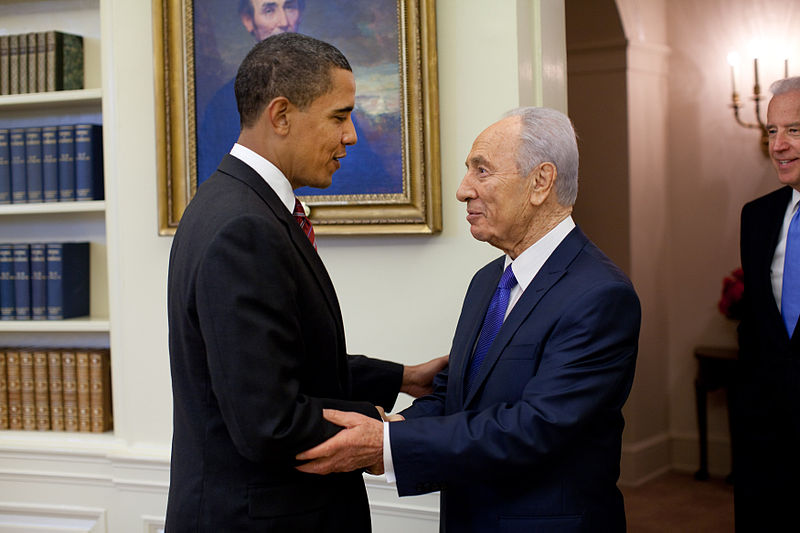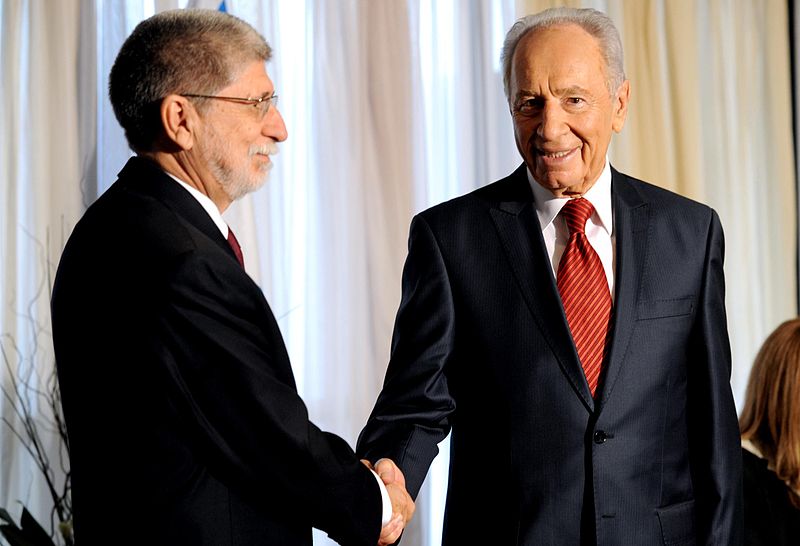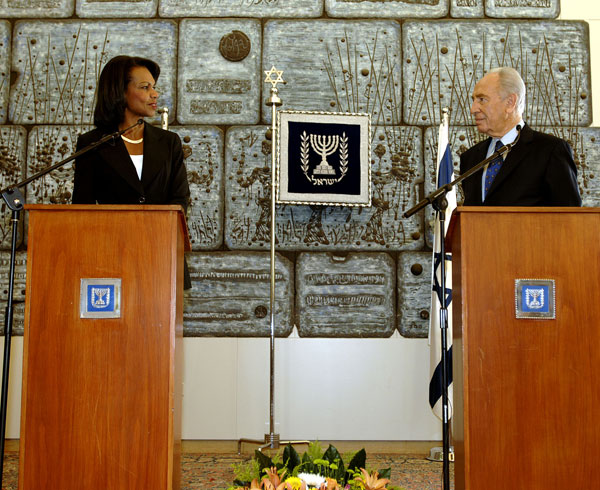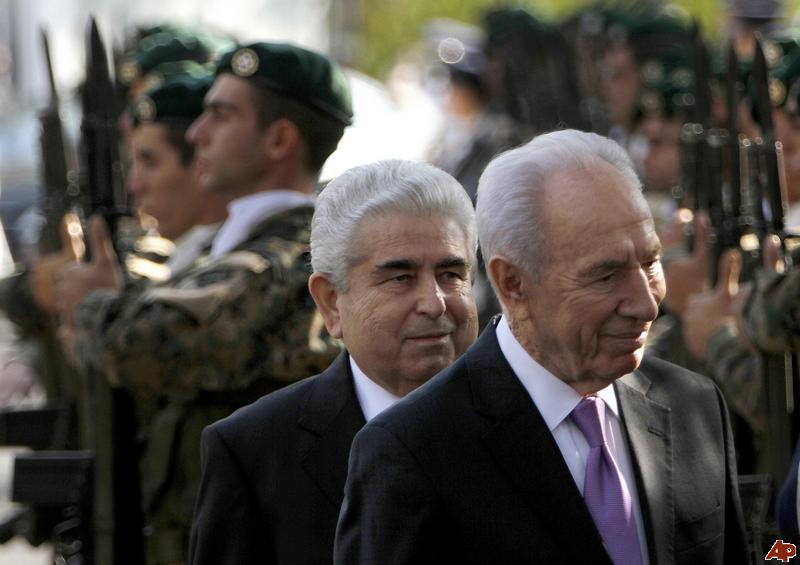<Back to Index>
- 9th President of Israel Shimon Peres, 1923
PAGE SPONSOR
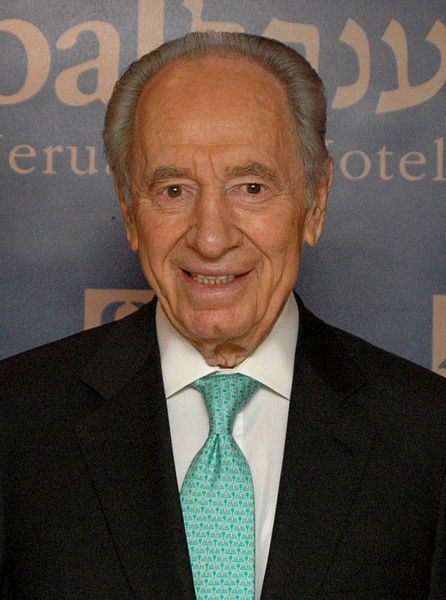
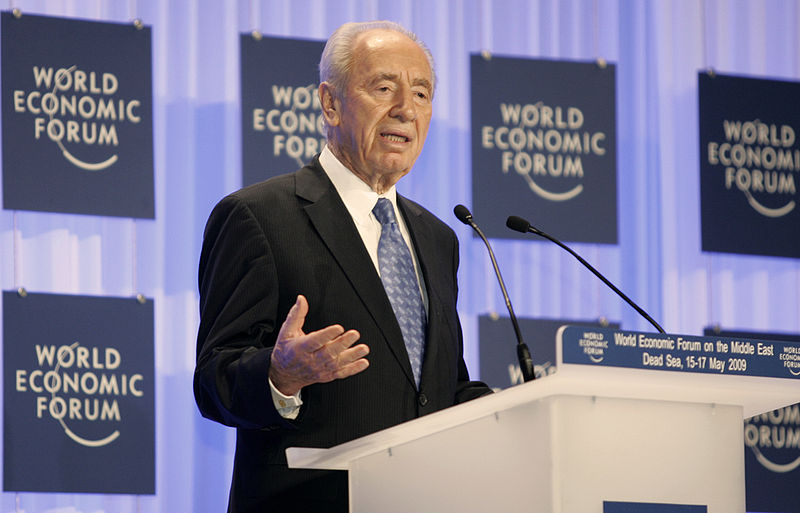
Shimon Peres (Hebrew: שמעון פרס, born Szymon Perski August 2, 1923 - September 28, 2016) was the ninth President of the State of Israel. Peres served twice as the eighth Prime Minister of Israel and once as Interim Prime Minister, and was a member of 12 cabinets in a political career spanning over 66 years. Peres was elected to the Knesset in November 1959 and, except for a three month long hiatus in early 2006, served continuously until 2007, when he became President.
He held several diplomatic and military positions during and directly after Israel's War of Independence. His first high level government position was as Deputy Director General of Defense in 1952, and Director General in 1953 through 1959. During his career, he has represented five political parties in the Knesset: Mapai, Rafi, the Alignment, Labor and Kadima, and has led Alignment and Labor. Peres won the 1994 Nobel Peace Prize together with Yitzhak Rabin and Yasser Arafat for the peace talks that he participated in as Israeli Foreign Minister, producing the Oslo Accords.
Peres was nominated in early 2007 by Kadima to run in that year's presidential election, and was elected by the Knesset to the presidency on 13 June 2007 and sworn into office on 15 July 2007 for a seven year term. He was the first former Prime Minister to be elected President of Israel.
Peres was the world's oldest de jure head of state.
Shimon Peres was born Szymon Perski on 2 August 1923 in Wiszniewo, Poland (now Višnieva, Belarus), to Yitzhak (1896 – 1962) and Sara (b. 1905 née Meltzer) Perski. The family spoke Hebrew, Yiddish and Russian at home, and Peres learned Polish at school. He later learned English and French. His father was a lumber merchant, later branching out into other commodities while his mother was a librarian. Peres had a younger brother, Gershon, and was a first cousin of American actress Lauren Bacall (born Betty Joan Persky).
Peres' grandfather, Rabbi Zvi Meltzer, a grandson of Rabbi Chaim Volozhin,
had a great impact on his life. In an interview, Peres said: "As a
child, I grew up in my grandfather's home… I was educated by him… my
grandfather taught me Talmud. It was not as easy as it sounds. My home
was not an observant one. My parents were not Orthodox but I was Haredi. At one point, I heard my parents listening to the radio on the Sabbath and I smashed it." All of Peres' relatives who remained in Wiszniewo in 1941 were murdered during the Holocaust, many of them (including Rabbi Meltzer) burned alive in the town's synagogue.
In 1932, Peres' father immigrated to Palestine and settled in Tel Aviv. The family followed him in 1934. He attended Balfour Elementary School and High School, and Geula Gymnasium (High School for Commerce) in Tel Aviv. At 15, he transferred to Ben Shemen agricultural school and lived on Kibbutz Geva for several years. Peres was one of the founders of Kibbutz Alumot. In 1941 he was elected Secretary of Hanoar Haoved Vehalomed, a Labor Zionist youth movement, and in 1944 returned to Alumot, where he worked as a dairy farmer, shepherd and kibbutz secretary.
In 1945, Peres married Sonya Gelman, who preferred to remain outside the public eye. They had three children. Sonya Peres was unable to attend Shimon's inauguration ceremony due to ill health. She died on 20 January 2011, aged 87.
In 2005, he was voted the 11th greatest Israeli of all time, in a poll by the Israeli news website Ynet to determine whom the general public considered the 200 Greatest Israelis.
In 1947, Peres joined the Haganah, the predecessor of the Israel Defense Forces. David Ben - Gurion made him responsible for personnel and arms purchases.
In
1952, he was appointed Deputy Director General of the Ministry of
Defense, and in 1953, at the age of 29, became the youngest ever
Director General of the Ministry of Defense. He was involved in arms
purchases and establishing strategic alliances that were important for
the State of Israel. He was instrumental in establishing close relations
with the French, securing massive amounts of quality arms that, in
turn, helped to tip the balance of power in the region. Owing to Peres' mediation, Israel acquired the advanced Dassault Mirage III French jet fighter, established the Dimona nuclear reactor and entered into a tri-national agreement with France and the United Kingdom, positioning Israel in what would become the 1956 Suez Crisis.
Peres was first elected to the Knesset in the 1959 elections, as a member of the Mapai party. He was given the role of Deputy Defense Minister, which he fulfilled until 1965. Peres and Moshe Dayan left Mapai with David Ben - Gurion to form a new party, Rafi, which reconciled with Mapai and joined the Alignment (a left wing alliance) in 1968.
In 1969, Peres was appointed Minister of Immigrant Absorption and in 1970 became Minister of Transportation and Communications. In 1974, after a period as Information Minister, he was appointed Minister of Defense in the Yitzhak Rabin government, having been Rabin's chief rival for the post of Prime Minister after Golda Meir resigned in the aftermath of the Yom Kippur War. During this time, Peres continued to challenge Rabin for the chairmanship of the party, but in 1977, he again lost to Rabin in the party elections.
Peres succeeded Rabin as party leader prior to the 1977 elections when Rabin stepped down in the wake of a foreign currency scandal involving his wife. As Rabin could not legally resign from the transition government, he officially remained Prime Minister, while Peres became the unofficial acting Prime Minister. Peres led the Alignment to its first ever electoral defeat, when Likud under Menachem Begin won sufficient seats to form a coalition that excluded the left. After only a month on top, Peres assumed the role of opposition leader. After turning back a comeback bid by Rabin in 1980 Peres led his party to another, narrower, loss in the 1981 elections. In 1984, the Alignment won more seats than any other party but failed to muster the majority of 61 mandates needed to form a left wing coalition. Alignment and Likud agreed to an unusual "rotation" arrangement in which Peres would serve as Prime Minister and the Likud leader Yitzhak Shamir would be Foreign Minister. A highlight of this time in office was a trip to Morocco to confer with King Hassan II.
After two years, Peres and Shamir traded places. In 1986 he became foreign minister. In 1988, the Alignment led by Peres suffered another narrow defeat. He agreed to renew the coalition with the Likud, this time conceding the premiership to Shamir for the entire term. In the national unity government of 1988 – 90, Peres served as Vice Premier and Minister of Finance. He and the Alignment finally left the government in 1990, after "the dirty trick" – a failed bid to form a narrow government based on a coalition of the Alignment, small leftist factions and ultra orthodox parties.
From 1990, Peres led the opposition in the Knesset, until, in early 1992, he was defeated in the first primary elections of the new Israeli Labor Party (which had been formed by the consolidation of the Alignment into a single unitary party) by Yitzhak Rabin, whom he had replaced fifteen years earlier. Peres remained active in politics, however, serving as Rabin's foreign minister from 1992. Secret negotiations with Yasser Arafat's PLO organization led to the Oslo Accords, which won Peres, Rabin and Arafat the Nobel Peace Prize. After Rabin's assassination in 1995, Peres again became Prime Minister.
During
his term, Peres promoted the use of the Internet in Israel and created
the first website of an Israeli prime minister. However, he was narrowly
defeated by Benjamin Netanyahu in the first direct elections for Prime Minister in 1996. In 1997 he did not seek re-election as Labor Party leader and was replaced by Ehud Barak.
Barak rebuffed Peres's attempt to secure the position of party
president and upon forming a government in 1999 appointed Peres to the
minor post of Minister of Regional Co-operation. Peres played little role in the Barak government.
In 2000 Peres ran for a seven year term as Israel's President, a ceremonial head of state position, which usually authorizes the selection of Prime Minister. Had he won, as was expected, he would have been the first ex-Prime Minister to be elected President. He lost, however, to Likud candidate Moshe Katsav.
Following Ehud Barak's defeat by Ariel Sharon in the 2001 direct election for Prime Minister,
Peres made yet another comeback. He led Labor into a national unity
government with Sharon's Likud and secured the post of Foreign Minister.
The formal leadership of the party passed to Binyamin Ben - Eliezer, and in 2002 to Haifa mayor, Amram Mitzna.
Peres was much criticized on the left for clinging to his position as
Foreign Minister in a government that was not seen as advancing the
peace process, despite his own dovish stance. He left office only when
Labor resigned in advance of the 2003 elections. After the party under
the leadership of Mitzna suffered a crushing defeat, Peres again emerged
as interim leader. He led the party into coalition with Sharon once
more at the end of 2004 when the latter's support of "disengagement"
from Gaza presented a diplomatic program Labor could support.
Peres won the chairmanship of the Labor Party in 2005, in advance of the 2006 elections. As party leader, Peres favored pushing off the elections for as long as possible. He claimed that an early election would jeopardize both the September 2005 Gaza withdrawal plan and the standing of the party in a national unity government with Sharon. However, the majority pushed for an earlier date, as younger members of the party, among them Ophir Pines - Paz and Isaac Herzog, overtook established leaders like Binyamin Ben - Eliezer and Haim Ramon, in the party ballot to divide up government portfolios. Peres continually led in the polls, defying predictions that rivals would overtake him. Peres lost the leadership election with 40% to Peretz's 42.4%.
| “ | Optimists and pessimists die the same way. They just live differently. I prefer to live as an optimist. | ” |
—Shimon Peres, 2005 | ||
On 30 November 2005 Peres announced that he was leaving the Labor Party to support Ariel Sharon and his new Kadima party. In the immediate aftermath of Sharon's debilitating stroke there was speculation that Peres might take over as leader of the party but most senior Kadima leaders, however, were former members of Likud and indicated their support for Ehud Olmert as Sharon's successor.
Labor reportedly tried to woo Peres back to the fold. Peres announced, however, that he supported Olmert and would remain with Kadima. Peres had previously announced his intention not to run in the March elections. Following Kadima's win in the election, Peres was given the role of Vice Prime Minister and Minister for the Development of the Negev, Galilee and Regional Economy.
On 13 June 2007, Peres was elected President of the State of Israel by the Knesset. 58 of 120 members of the Knesset voted for him in the first round (whereas 38 voted for Reuven Rivlin, and 21 for Colette Avital). His opponents then backed Peres in the second round and 86 members of the Knesset voted in his favor, while
23 objected. He resigned from his role as a Member of the Knesset the
same day, having been a member since November 1959 (except for a three
month period in early 2006), the longest serving in Israeli political
history. Peres was sworn in as President on 15 July 2007.
In November 2008, Peres received an honorary knighthood, Knight Grand Cross of the Order of St Michael and St George from Queen Elizabeth II in Buckingham Palace in London.
Peres
announced in April 2013 that he would not seek to extend his tenure
beyond 2014. His successor, Reuven Rivlin, was elected on June 10, 2014
and took office on July 24, 2014.
On
September 13, 2016, Peres, aged 93, suffered a severe stroke and was
hospitalized at Sheba Medical Center. His condition was reported to be
very serious, as he had suffered a massive brain hemorrhage and
significant bleeding. Two days later, he was reported as being in a
serious but stable condition. However, on September 26, an examination
found irreversible damage to his brainstem, indicating that it was not
possible for him to recover, and the following day, his medical
condition deteriorated significantly. He died on September 28.
On
hearing of his death, tributes came from leaders across the world. The
President of Russia, Vladimir Putin said: "I was extremely lucky to have
met this extraordinary man many times. And every time I admired his
courage, patriotism, wisdom, vision and ability." The President of
China, Xi Jinping said: "His death is the loss of an old friend for
China." And the President of India, Pranab Mukherjee said: "Peres would
be remembered as a steadfast friend of India." The President of the
United States, Barack Obama said: "I will always be grateful that I was
able to call Shimon my friend."
Peres
was described by The New York Times as having done "more than anyone to
build up his country’s formidable military might, then [having] worked
as hard to establish a lasting peace with Israel’s Arab neighbors."
The
funeral was held at Mount Herzl in Jerusalem on September 30, 2016,
with his burial place in the Great Leaders of the Nation section between
former Israeli Prime Ministers Yitzhak Rabin and Yitzhak Shamir.
About
4,000 mourners and world leaders from 75 countries attended the
funeral, with President Barack Obama among those who gave a eulogy.
Since the funeral for Nelson Mandela, this was only the second time
Obama traveled overseas for the funeral of a foreign leader. Among the
other delegates in attendance and speaking were former President Bill
Clinton. Other delegates included PA President Mahmoud Abbas, President
Francois Hollande of France, Prime Minister Justin Trudeau of Canada,
German President Joachim Gauck, President Enrique Pena Nieto of Mexico
and King Felipe VI of Spain. The UK also sent a large delegation.
Peres was once considered a "hawk". He was a protégé of Ben - Gurion and Dayan and an early supporter of the West Bank settlers during the 1970s. However, after becoming the leader of his party his stance evolved. More recently he had been seen as a dove, and a strong supporter of peace through economic cooperation. While still opposed, like all mainstream Israeli leaders in the 1970s and early 1980s, to talks with the PLO, he distanced himself from settlers and spoke of the need for "territorial compromise" over the West Bank and Gaza. For a time he hoped that King Hussein of Jordan could be Israel's Arab negotiating partner rather than Yasser Arafat. Peres met secretly with Hussein in London in 1987 and reached a framework agreement with him, but this was rejected by Israel's then Prime Minister, Yitzhak Shamir. Shortly afterward the First Intifada erupted, and whatever plausibility King Hussein had as a potential Israeli partner in resolving the fate of the West Bank evaporated. Subsequently, Peres gradually moved closer to support for talks with the PLO, although he avoided making an outright commitment to this policy until 1993.
Peres was perhaps more closely associated with the Oslo Accords than any other Israeli politician (Rabin included) with the possible exception of his own protégé, Yossi Beilin. He remained an adamant supporter of the Oslo Accords and the Palestinian Authority since their inception despite the First Intifada and the al-Aqsa Intifada (Second Intifada). However, Peres supported Ariel Sharon's military policy of operating the Israeli Defense Forces to thwart suicide bombings.
Peres' foreign policy outlook was markedly realist. To placate Turkey, Peres allegedly downplayed the Armenian genocide. Peres stated: "We reject attempts to create a similarity between the Holocaust and the Armenian allegations. Nothing similar to the Holocaust occurred. It is a tragedy what the Armenians went through but not a genocide." Although Peres himself did not retract the statement, the Israeli Foreign Ministry later issued a cable to its missions which stated that "The minister absolutely did not say, as the Turkish news agency alleged, “What the Armenians underwent was a tragedy, not a genocide"". However, according to Armenian news agencies, the statement released by the Israeli Consulate in Los Angeles did not include any mention that Peres had not said that the events were not genocide.
On the issue of the nuclear program of Iran and
the existential threat this poses for Israel, Peres stated, "I am not
in favor of a military attack on Iran, but we must quickly and
decisively establish a strong, aggressive coalition of nations that will
impose painful economic sanctions on Iran",
adding "Iran's efforts to achieve nuclear weapons should keep the
entire world from sleeping soundly." In the same speech, Peres compared Iranian President Mahmoud Ahmadinejad and his call to "wipe Israel off the map" to the genocidal threats to European Jewry made by Adolf Hitler in the years prior to the Holocaust. In
an interview with Army Radio on 8 May 2006 he remarked that "the
president of Iran should remember that Iran can also be wiped off the
map". Peres was a proponent of Middle East economic integration.
In May 1945, Peres married Sonya Gelman, whom he had met in the Ben Shemen Youth Village, where her father served as a carpentry teacher. The couple married after Sonya finished her military service in the British Army during World War II. Through the years Sonya chose to stay away from the media and keep her privacy and the privacy of her family, despite her husband's extensive political career. With the election of Peres for president, Sonya Peres, who had not wanted her husband to accept the position, announced that she would stay in the couple's apartment in Tel Aviv and not join her husband in Jerusalem. The couple thereafter lived separately. She died on 20 January 2011, aged 87, from heart failure at her apartment in Tel Aviv.
Shimon and Sonya Peres had three children:
- A daughter, Dr. Zvia ("Tsiki") Valdan, a linguist and professor at Beit Berl Academic College;
- An elder son, Yoni, director of Village Veterinary Center, a veterinary hospital on the campus of Kfar Hayarok Agricultural School near Tel Aviv. He specializes in the treatment of guide dogs;
- A younger son, Nehemia ("Chemi"), Co-founder / Managing General Partner of Pitango Venture Capital, one of Israel's largest venture capital funds. Chemi Peres is a former helicopter pilot in the IAF.
Peres was the first cousin of American movie star Lauren Bacall (born Betty Joan Perske, 1924).
